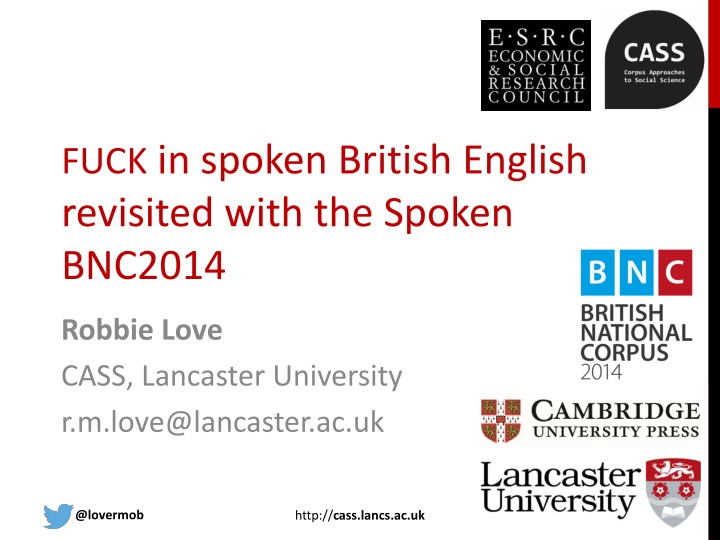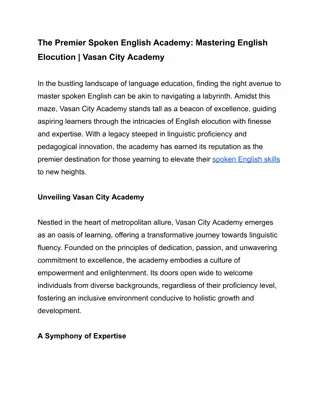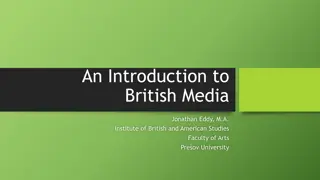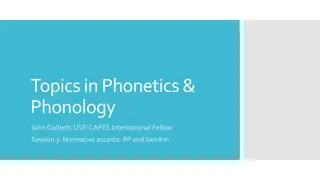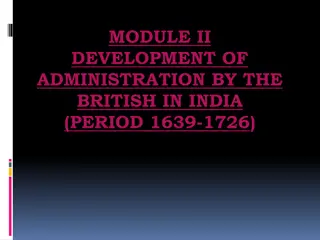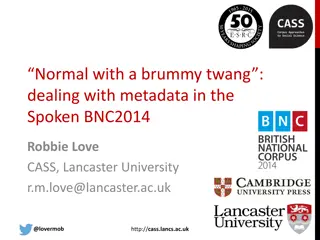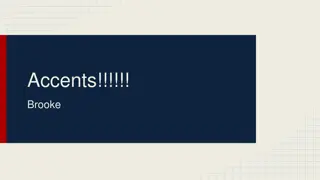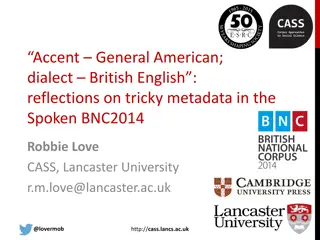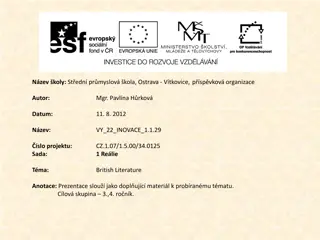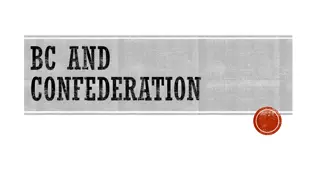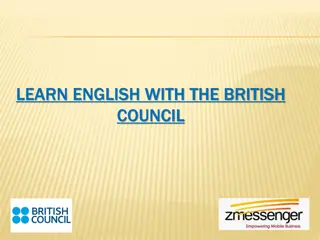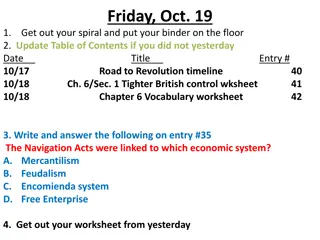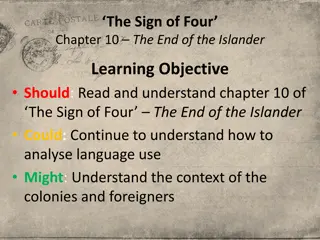FUCK in Spoken British English Revisited with Spoken BNC2014
Today's presentation delves into the use of profanity in spoken British English, focusing on findings from the Spoken BNC2014 corpus. Discover insights on bad language, its impact on social dynamics, and the unique characteristics of swear words within the corpus
Download Presentation

Please find below an Image/Link to download the presentation.
The content on the website is provided AS IS for your information and personal use only. It may not be sold, licensed, or shared on other websites without obtaining consent from the author.If you encounter any issues during the download, it is possible that the publisher has removed the file from their server.
You are allowed to download the files provided on this website for personal or commercial use, subject to the condition that they are used lawfully. All files are the property of their respective owners.
The content on the website is provided AS IS for your information and personal use only. It may not be sold, licensed, or shared on other websites without obtaining consent from the author.
E N D
Presentation Transcript
FUCK in spoken British English revisited with the Spoken BNC2014 Robbie Love CASS, Lancaster University r.m.love@lancaster.ac.uk @lovermob http://cass.lancs.ac.uk
Todays talk 1. The Spoken BNC2014 2. Bad language why? 3. Data & methods 4. Findings 5. Thoughts so far & further work 6. Important Spoken BNC2014 dates @lovermob http://cass.lancs.ac.uk 2
The Spoken BNC2014 1000 hours of conversation (1,252 texts) Nearly 700 unique speakers More than 11 million words @lovermob http://cass.lancs.ac.uk 3
The Spoken BNC2014 Lancaster University + Cambridge University Press Both parties Plan & design Encourage participation media campaigns Disseminate information Fund project equally CUP Claire Dembry Corresponds with contributors Collects & transcribes recordings Lancaster Robbie Love, Andrew Hardie, Vaclav Brezina, Tony McEnery Documents the compilation of the corpus Carries out methodological investigations Converts transcripts to XML, encoding Annotates corpus Initial analysis Prepares for public release/hosts corpus @lovermob http://cass.lancs.ac.uk 4
Bad language Swearing is fascinating a marker of distinction between social groups (McEnery 2005: 24) a rich emotional, psychological, and sociocultural phenomenon (Jay 2009: 153) More psychologically arousing (Janschewitz 2008) More memorable (Jay et al. 2008) More stressful to produce (Bowers & Pleydell-Pearce 2011) 6
Bad language People care about it one way or another e.g. links to anti-social behaviour 7
Bad language McEnery (2005): Bad language words = BLWs swear words, always taboo cunt, fuck, shit, twat words which are not inherently taboo but can be used to offend tart, pig, god, gay 8
Bad language revisited Replication of McEnery (2005) on the new data BLWs in Spoken BNC2014S compared to the Spoken BNC1994DS: Frequency wholesale & within social groups Strength Meaning using the McEnery et al. (2000) categorization scheme Looking at over 150 BLWs including FUCK (cf. McEnery & Xiao 2004) 9
Research questions Quantitative Is FUCK becoming more/less popular? (How) has the distribution of FUCKchanged between the early 1990s and the present day? Qualitative (How) has the meaning of FUCK changed in the same period? Search term: [word=".*fuck.*"%c] @lovermob http://cass.lancs.ac.uk 10
Data Spoken BNC1994DS (demographically-sampled) 5,014,655 words 1000+ speakers of British English 153 texts Date range: 1985-1993 @lovermob http://cass.lancs.ac.uk 11
Data Spoken BNC2014S (Sample) 4,789,185 words 376 speakers of British English 567 texts Date range: 2012-2015 Used by early access data grant recipients for launch publications Search term: [word=".*fuck.*"%c] @lovermob http://cass.lancs.ac.uk 12
Overall frequency 1990s: 564.3 per million 2010s: 561.1 per million Difference not significant i.e. stable 2nd most frequent BLW in both corpora Behind BLOODY (1990s) Behind GOD (2010s) Considered strongest (Ofcom 2016), in the company of only 15 other BLWs including cunt, faggot, golliwog, motherfucker, nigger, retard, spastic @lovermob http://cass.lancs.ac.uk 13
Strength 1800 1600 1400 1200 1000 800 600 400 200 0 mild medium strong strongest Spoken BNC1994DS Spoken BNC2014S @lovermob http://cass.lancs.ac.uk 14
FUCK: gender 600 500 400 300 200 100 0 Female Male Spoken BNC1994DS Spoken BNC2014S @lovermob http://cass.lancs.ac.uk 15
FUCK: age 1800 1600 1400 1200 1000 800 600 400 200 0 0-14 15-24 25-34 35-44 45-59 60+ Age group Spoken BNC1994DS Spoken BNC2014S @lovermob http://cass.lancs.ac.uk 16
FUCK: Social Grade 1200 1000 800 600 400 200 0 AB C1 C2 DE Spoken BNC1994DS Spoken BNC2014S @lovermob http://cass.lancs.ac.uk 17
FUCK: NS-SEC 1600 1400 1200 1000 800 600 400 200 0 1.1 1.2 2 3 4 5 6 7 8 Uncat NS-SEC 3 ( intermediate occupations ) + 4 ( small employers & own account workers ) = Social Grade C1 @lovermob http://cass.lancs.ac.uk 18
Categorization Spoken British National Corpus (1990s) Rank Code Description 1 E Emphatic adverb/adjective: He fucking did it in the fucking car 2 N Premodifying intensifying negative adjective: the fucking idiot 3 G General expletive (Oh) Fuck! 4 I Idiomatic set phrase : fuck all give a fuck 5 D Destinational usage: Fuck off! He fucked off Spoken British National Corpus (2010s) Rank Code Description 1 I Idiomatic set phrase : fuck all give a fuck 2 G General expletive (Oh) Fuck! 3 F Figurative extension of literal meaning: to fuck about 4 D Destinational usage: Fuck off! He fucked off 5 A Predicative negative adjective: Is it fucked? @lovermob http://cass.lancs.ac.uk 19
Categorization In the Spoken BNC2014S Idioms e.g. what the fuck = 31% Figurative e.g. fuck it up = 15% Emphatic adverb & adjective e.g. in the fucking car = 2.7% (was 55% in Spoken BNC1994DS) The meaning appears to have changed Grammaticalization? @lovermob http://cass.lancs.ac.uk 20
Old/new forms FUCK as lemma (1994) fucking (2164), fuck (583), fucked (62), fucker(s) (25), fucks (10), mother(-)fucker(s) (6), mother- fucking (1), fluctu-fucking-ation (1), fuckhead (1) FUCK as lemma (2014) fucking (1530), fuck (912), fucked (168), fucker(s) (32), fucks (27), motherfucker(s) (9), fuck(-)head (5), fuckered (2), fuckwits (1), fucktard (1) @lovermob http://cass.lancs.ac.uk 21
Bad language: thoughts so far Change in bad language like all language can happen very quickly the use of FUCK does appear to have changed to some extent gender & age particularly Convergence of male speech & female speech ? Frequency change is one thing, but social distribution & qualitative analysis very powerful Bad language is very context-dependent when is FUCK offensive? When is it not? Harder to tackle using corpus linguistics alone @lovermob http://cass.lancs.ac.uk 22
Important dates & publications June 2017: Spoken BNC2014 symposium (Lancaster) July 2017: workshop + paper at CL2017 (Birmingham) Autumn 2017: full public release on CQPweb IJCL 22(3), Spoken BNC2014 special issue, inc. Love, Dembry, Hardie, Brezina & McEnery (2017 fc) Routledge book Corpus Approaches to Contemporary British Speech (2018, eds. Brezina, Love & Aijmer) @lovermob http://cass.lancs.ac.uk 23
References Bowers JS, Pleydell-Pearce CW (2011) Swearing, Euphemisms, and Linguistic Relativity. PLoS ONE 6(7). doi:10.1371/journal.pone.0022341 Brezina, V., R. Love and K. Aijmer (eds.). (2018 fc). Corpus Approaches to Sociolinguistic Variation in Contemporary British English: An Exploration of the Spoken BNC2014. New York: Routledge. Hardie, A. (2012). CQPweb combining power, flexibility and usability in a corpus analysis tool. International Journal of Corpus Linguistics 17 (3): 380-409. Janschewitz, K. (2008). Taboo, emotionally-valenced, and emotionally-neutral word norms. Behavior Research Methods, Instruments, & Computers, 40, 1065 1074. Jay, T. (2009a). The utility and ubiquity of taboo words. Perspectives on Psychological Science 4. 153 161. Jay, T., Caldwell-Harris, C., & King, K. (2008). Recalling taboo and nontaboo words. American Journal of Psychology, 121, 83 103. Love, R., Dembry, C., Hardie, A., Brezina, V. and McEnery, T. (2017 fc). The Spoken BNC2014: designing and building a spoken corpus of everyday conversations. In International Journal of Corpus Linguistics, 22:3. McEnery, T. (2005). Swearing in English: Bad language, purity and power from 1586 to the present. New York: Routledge. McEnery, T., Baker, P. & Hardie, A. (2000). Swearing and abuse in modern British English. In: PALC 99: Practical Applications in Language Corpora. Peter Lang, Frankfurt am Main, pp. 37-48. McEnery, T., Love, R. and Brezina, V. (eds.). (2017 fc). International Journal of Corpus Linguistics, 22:3, Special Issue. McEnery, T. & Xiao, Z. (2004). Swearing in modern British English: the case of fuck in the BNC. In Language and Literature, 13(3). doi:10.1177/0963947004044873. @lovermob http://cass.lancs.ac.uk 24
r.m.love@lancaster.ac.uk @lovermob @BNC_2014 @lovermob http://cass.lancs.ac.uk 25
